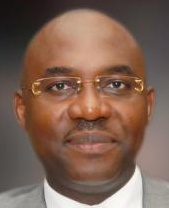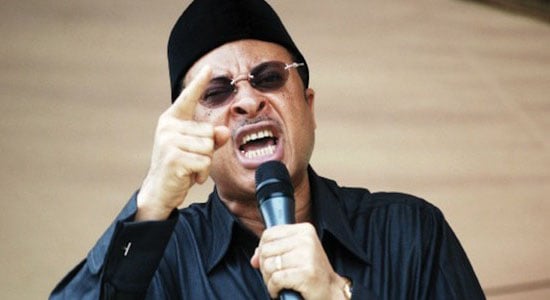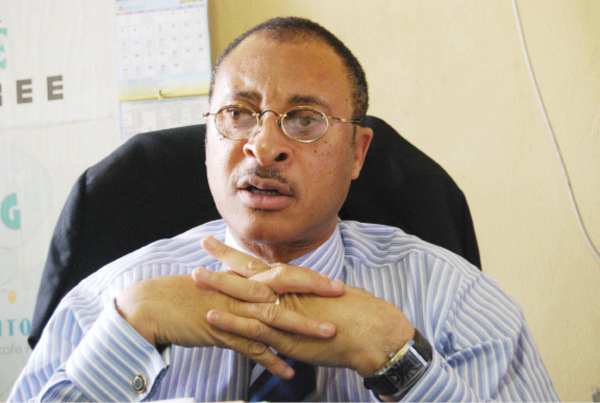It was undoubtedly a bizarre way to greet. A decade or so ago, he ran into yours sincerely on the sidelines of a public lecture in Lagos. Instinctively, Professor Pat Utomi thundered at me, pointing at an imaginary bowl of soup: “Louis, see meat!”
Moving closer and finger still pointing into the void, he repeated dead-serious: “Yes, that meat, take that one”, before we were clasped in a bear-hug amid raucous laughter that turned every eye in our direction.
After Prof had walked away, an onlooker, eyes dilated with curiosity, stepped over and sought to make a meaning of the spectacle that just unfolded. Unprepared to divulge a dark secret, least of all to a complete stranger, I chose to reply rather dismissively: “Oh, never mind, it’s just a little joke Prof likes sharing whenever we meet.”
But truth is: beneath that joke is a real-life story of power and denial. Earlier, a governor in one of the South-South states was dining with a visiting top media executive in the state capital. Either out of a Daniel-in-lion’s-den daring or simply having the tongue loosened by too much wine, the guest soon reportedly uttered something that pushed their over-the-lunch banters to a dangerous bend.
Advertisement
“Lest I forget, Your Excellency,” he began earnestly “What’s this story circulating in town that you’re not performing; that your administration is not very active?…”
Gamely, the governor cut him short. He responded by drawing the attention of the wayward guest to a choice bribe in the soup bowl, “John (real name withheld), you see that meat”, directing with a finger, “Take that one.”
The host’s generosity here was no doubt meant to subvert. So, the meaning read to it was roughly this: well the impudent inquisitor had the temerity to pry, the space to speak only because his mouth was empty!…
Advertisement
Ever since that epic encounter was narrated to the hearing of Prof, yours sincerely and a few others at a privileged get-together, its sheer hilarity, fueled by a shared desire to keep the memory alive, led both of us to adopting it as a way of greeting wherever we meet over the years. In Prof’s mind, I imagine this allegory is taken not as ordinary joke; but more as a sacred injunction, a duty imposed on anyone so positioned never to allow the moment pass without discharging the patriotic obligation of speaking truth to power.
Anyone who has tracked Utomi’s odyssey in the last three decades as a public intellectual as well as moral evangelist replete with tales of uncommon sacrifice and unstinting fidelity to high principles will hardly be left with any option than acknowledge that he, with force of personal example, perfectly illustrates an efficient delivery of that promise. Not many can be counted as having had as much access to people of power in the past three decades like Prof. But only a few would still be recognized today as retaining that independence of thought and action like him.
Indeed, as the Prof joins the exclusive club of sexagenarians tomorrow, celebration bells will certainly chime rapturously. From the mangrove of his native Ibusa in Delta State to the arid effulgence of Kano, his birthplace, where his umbilical chord was buried. Down to the cosmopolitan Lagos, his place of residence. Not surprising, the fluency he renders Hausa language is only rivaled by the clarity of his Yoruba and mother-tongue Igbo.
To be sure, Prof’s edge is not so much by the sparkles of a prodigious scholarship in the very restricted territory of political economy. (Indeed, being the most populous, if not the most affluent black nation in the world, it follows that Nigeria boasts the highest population of doctorate holders and professors in the negroid universe as well.) What indeed sets Utomi apart from the multitude is the character he has consistently shown over the years in an environment where many an intellectual has been exposed to be either counterfeit or plain savage hooded by drooping mortarboard. As immortal Mahatma Ghandi forever cautions, education without character is a social sin. Physicist Albert Einstein puts it differently that “Don’t strive to be a man of success, but a man of value”.
Advertisement
With the continued vandalization of the nation’s moral edifice today in which almost everybody that is somebody across all the national divides is directly implicated or remotely tainted, what better time can there be than now to salute the few exemplars who have kept the faith. The few who, by resisting the forbidden apple, have continued to demonstrate that the historic duty expected of public intellectuals alongside their allies in the progressive province ought not to just be limiting themselves to merely salvaging what is left, but also finding the energy and audacity to push the frontiers even further by re-erecting the moral universe entirely.
In an age when the nation seems mired in a dark tunnel, where the preferred statesman is a conman, where the anointed cleric bears false prophecies, where father and son are caught in the abominable web of Dasukigate, when the bearer of communal memory is a drunkard, what Utomi’s exceptionality then offers is a flicker of hope indeed.
And then the haunting irony. For a man who has enriched national conversation in the past three decades with a unique brand of scholarly activism, a big puzzle then that the Nigerian state is yet to recognize him. At a time certified crooks and pimps are yearly decorated lavishly with national medals. In a way, this leads to yet another sordid revelation: the jarring story of the bankrupt philosophy behind the prevailing national leadership recruitment and training template.
By any standard, only very few would equal Utomi in terms of personal commitment to mentoring the young ones to become better citizens. This writer can attest to Utomi’s exemplary exertions here. He is always at home in any company regardless of age, creed or class barrier. My association with him began when I was “conscripted” into the “Patito Gang”, a television talk-show he conceived in the 90s. Essentially, the weekly programme was the academic equivalent of a coliseum where gladiators of varied tendencies/ideologies would lock intellectual horns on topical issues with the vision to proffering new prescriptions and perspectives to the national condition. I recall we used to rendezvous at a modest studio tucked in a no less nondescript neighborhood in Surulere, Lagos. The roll-call could as well be a national parade as faculty members were drawn from across the country. Once the “gangsters” began to assemble each Wednesday, the pre-recording sessions were sometimes even more giddy and thunderous, with Prof himself having to occasionally blow a terminal whistle once tempers began to tip above tolerable limit.
Advertisement
Coming during the military era when national impulse seemed increasingly stifled by authoritarian vacuity, “Patito Gang” was undoubtedly a modest attempt to rekindle the culture of robust debate last witnessed by the nation in the 1970s. By mid-80s, the death-knell was apparently sounded with the philistinism of the Babangida junta which did not find it shameful at all to officially proclaim fatwa on ideological opponents, particularly those embedded on campuses, derogatively accused of “teaching what they are not paid to teach”.
It is a testament to Prof’s enduring passion for the pursuit of knowledge that for all the long years the programme was syndicated on some television stations, he was the sole financier. Corporate sponsorships were rare. If they came at all, they were few and far between.
Advertisement
The scholarly intercourse was not restricted to the hidden Surulere studio. From time to time, Prof made it a duty to regularly host yet another tribe of young writers alongside other young turks from the corporate world, either at his private residence on Lagos island or any choice restaurant in town. The sole item on the agenda: Nigeria. Over sumptuous meals and free flow of wine, we would laugh, argue, disagree and gossip until there was nothing else to discuss. In fact, it was at one of such gatherings that the story of “Take that meat!” was first told.
Such fellowships were usually even more electrifying whenever any of Prof’s age-mates/contemporaries happened to be in the house. Then, you were sure of endless recollections of Prof’s exploits and escapades in their younger days. One of them was the late Pini Jason, a celebrated journalist in his own right. Given Prof’s acclaimed prodigious tongue and prolific pen, Pini once teased that his only rival would be the peripatetic “Obioma” tailor in Igbo folklore. To him, it explained why Utomi hardly ever turns down any invitation to speak, to engage, anywhere, any time. Indeed, in the nation’s fecund lecture circuits, he is reputed to be one of a few who could seamlessly keep multiple high-profile speech-making appointments within a day, without loss of flavor or depth at each stop.
Advertisement
The last time we met was late last year at a function in Benin. Typically, Prof arrived anonymously just before serious speeches were to be made and sneaked out just before the disc jockey resumed with his own profanity. Despite the near chaos of the atmosphere, Prof still created time to field questions from a pesky reporter. Outside the marquee, I had to arrange for my driver to drop him off at the airport to catch ARIK’s last flight to Lagos. Later that night, when finally I had time for my cell-phone, I discovered I had missed five calls from Prof. My heart skipped a bit. What could be the matter?
Immediately, I called back. Ever so graceful, he began by apologizing if he had disturbed my night with the torrent of calls. Just that he had forgotten something so dear behind in Benin. From the grief in his otherwise usually boisterous voice tonight, you would imagine a huge bullion van stuffed to the brim with mint-fresh dollars (that would make even the industrial ATM ascribed to Dasukigate look miserably small) was stranded somewhere in Benin. What exactly? It turned out the source of Prof’s intense lamentation was no more than a missing book! Tucked inside was something much more precious: a piece of paper on which he had begun to write some thoughts to form a lecture he was billed to deliver two days later.
Advertisement
Eager to put him out of that misery, I personally went to the garage to conduct a clinical search of the car that had ferried him to the airport. Finding nothing, I called the event planners first thing in the morning to comb everywhere in case they might still locate the book and the loose sheet. In short, the only step remaining for me to take was announce in the most widely-read local newspaper as well as radio and television stations a tidy sum as handsome reward for anyone with even the minutest shred of clue that could possibly lead to the recovery of Prof’s missing prized assets.
Before the middle of the following day, I finally summoned the courage to announce the futility of all my own forensic search. He took it with accustomed equanimity, announcing he had since drawn up a contingency plan by making another sketch for the impending keynote address. His only consolation was that, at least, he could always pick up another copy of the missing book during his next trip abroad.
Such is Prof’s near maniacal obsession, not with matters of gold or silver, but with the written words and the ideas they define.
So, will Patrick Ikedinachi Utomi then step forward and take a bow.
Views expressed by contributors are strictly personal and not of TheCable.
Add a comment







